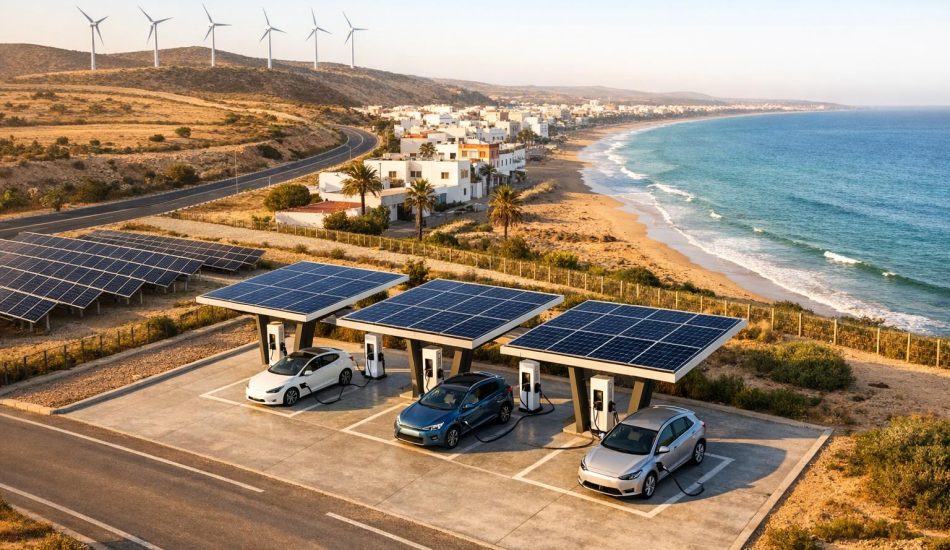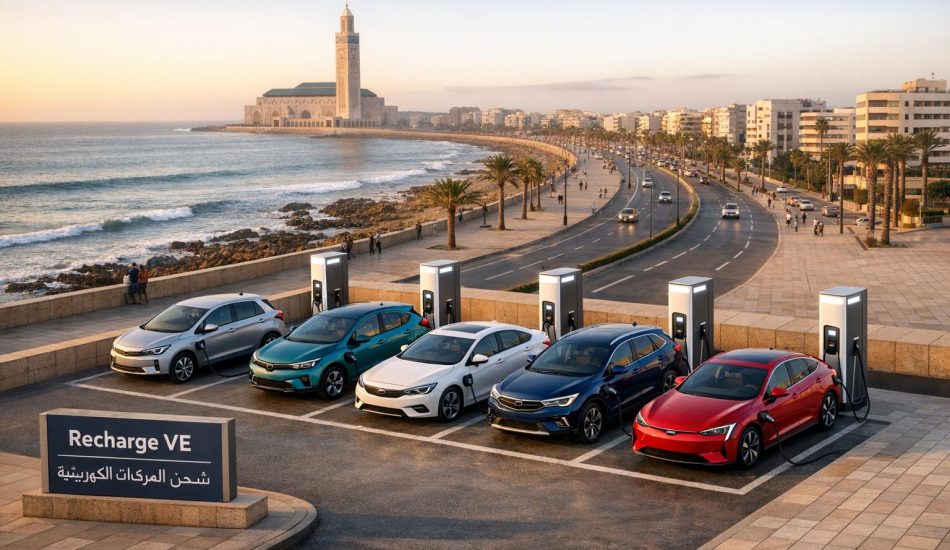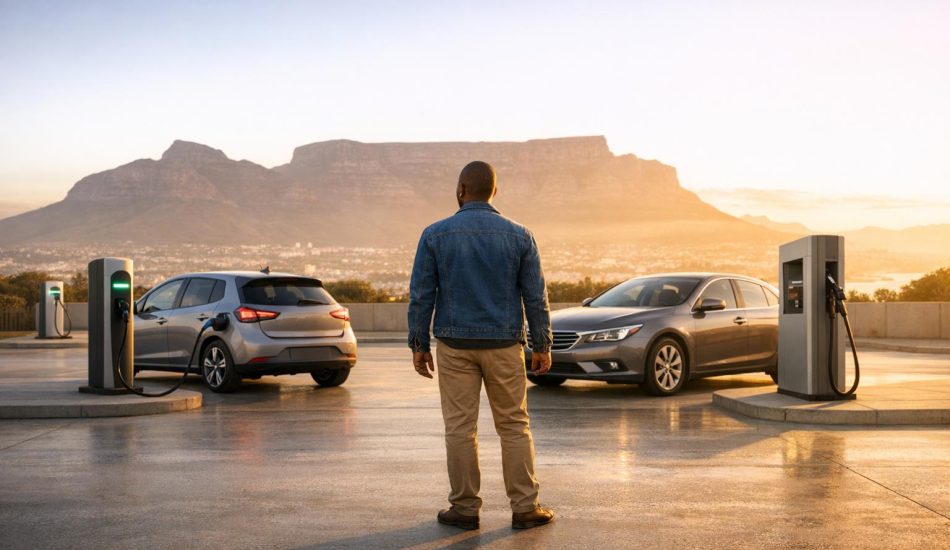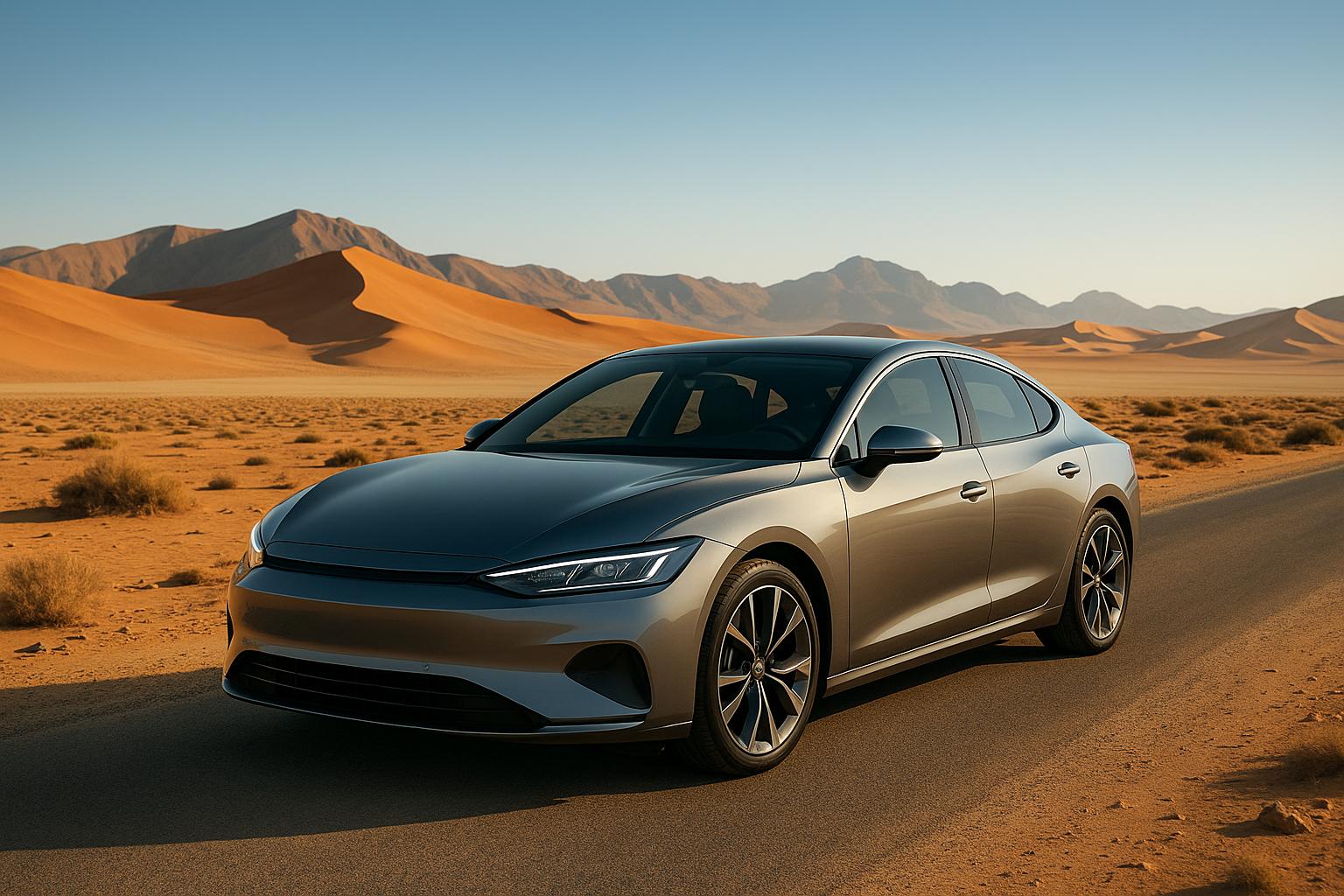
In 2025, Namibia’s electric vehicle (EV) market is growing, driven by solar energy potential, rising fuel costs, and improved EV technology. This guide highlights key EV models, pricing, and ownership tips for Namibians considering the switch to electric cars.
Key Highlights:
- Affordable Options: Used Nissan Leafs start at $11,000–$14,000, while new models range from $15,000 upwards.
- Popular Models:
- Nissan Leaf (2025): $14,600–$15,100 for nearly-new models.
- BYD Shark 6: A hybrid bakkie designed for diverse terrains.
- Tesla Model 3 Long Range RWD: $42,490 with a 363-mile range.
- Volkswagen ID.4: $39,735–$44,875, offering up to 291 miles of range.
- Charging Infrastructure: Home charging is common, with public stations emerging in cities like Windhoek and Swakopmund.
- Cost Savings: EVs cost 40% less to maintain and offer lower per-kilometer energy costs compared to gas-powered vehicles.
- Financing Options: Local banks and dealerships provide loans, leasing, and trade-in programs to make EV ownership accessible.
Namibians can explore options through platforms like EV24.africa, offering transparent pricing, delivery services, and financing support for a smooth purchase process.
Windhoek inaugurates its first electric vehicle charging port – nbc
Best Electric Car Models in Namibia (2025)
Namibia’s electric vehicle (EV) market is growing, offering a variety of options for those ready to transition from gas-powered vehicles. These models cater to different needs, from daily commuting to long-range travel, and come with features and pricing to match.
Nissan Leaf (2025 Model)
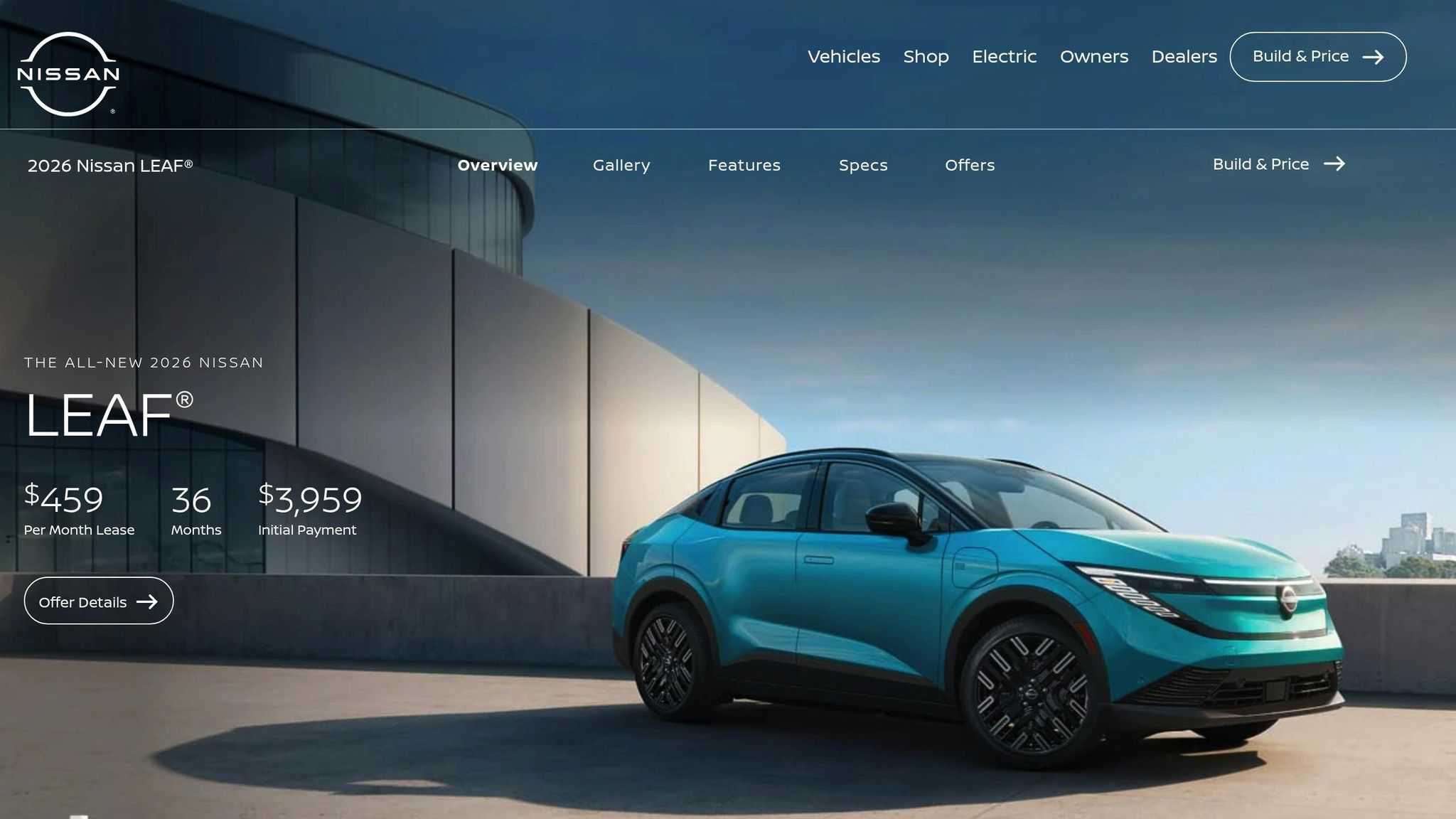
The Nissan Leaf continues to be a popular and practical choice for drivers in Namibia. Known for its dependability and ease of use, it’s particularly suited for daily commutes. As of November 2025, Autocraft Japan lists two nearly-new models: a gray Leaf with 31 miles (50 km) priced at $14,600 and a red Leaf with 93 miles (150 km) for $15,100. Both vehicles feature automatic transmissions.
These prices make the Leaf one of the more affordable options for those looking to enter the EV market. Its compact design and user-friendly transmission are ideal for navigating urban areas.
BYD Shark 6 (Plug-in Hybrid Bakkie)
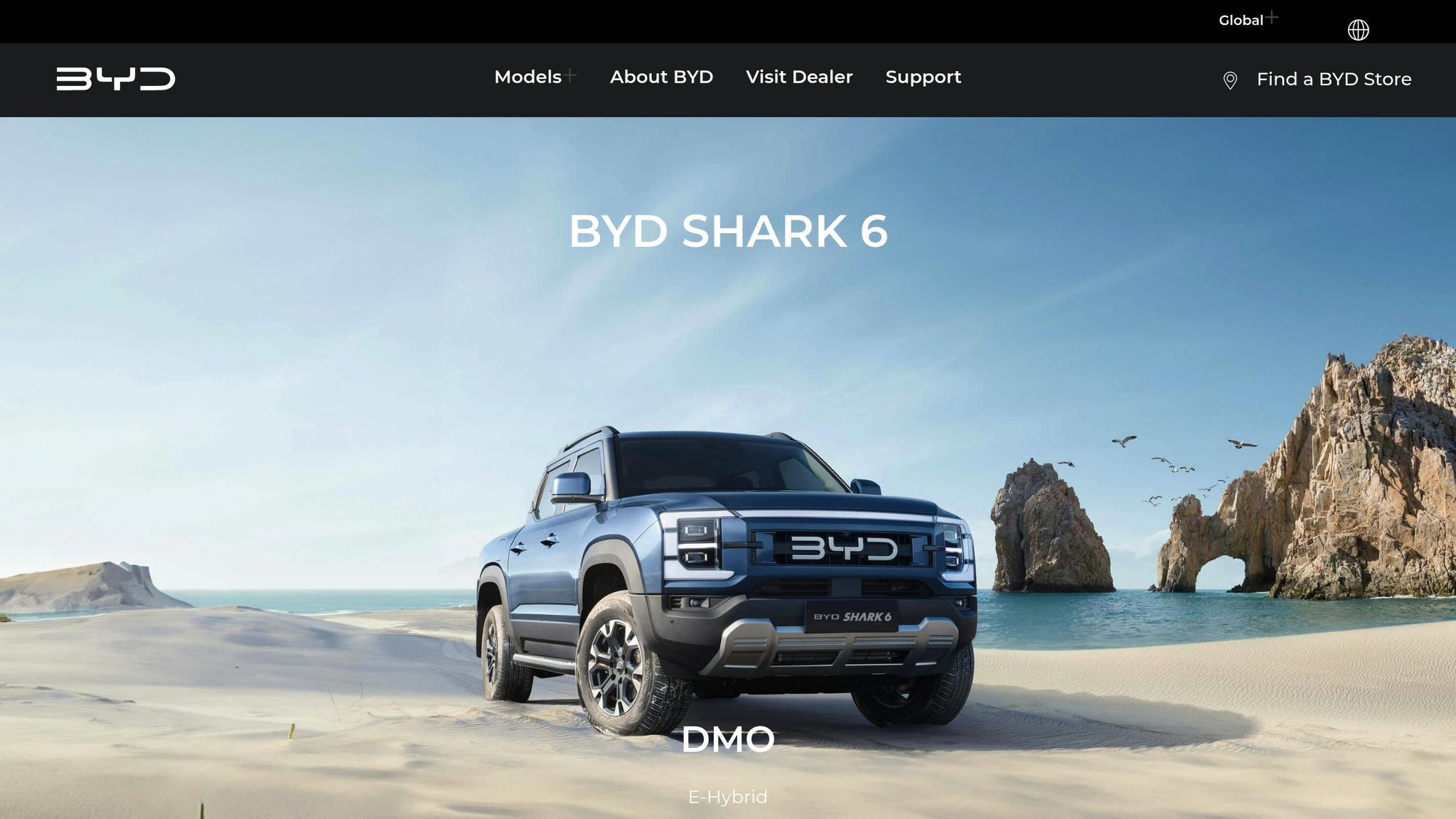
For those needing a versatile pickup truck, the BYD Shark 6 is an attractive option. This plug-in hybrid bakkie combines an electric motor with a traditional engine, offering both fuel savings and adaptability. It’s designed for a range of uses, from city driving to traversing Namibia’s diverse terrains. While pricing hasn’t been finalized, its hybrid nature makes it a practical choice for both personal and commercial purposes.
BYD Seal (2025 Model)
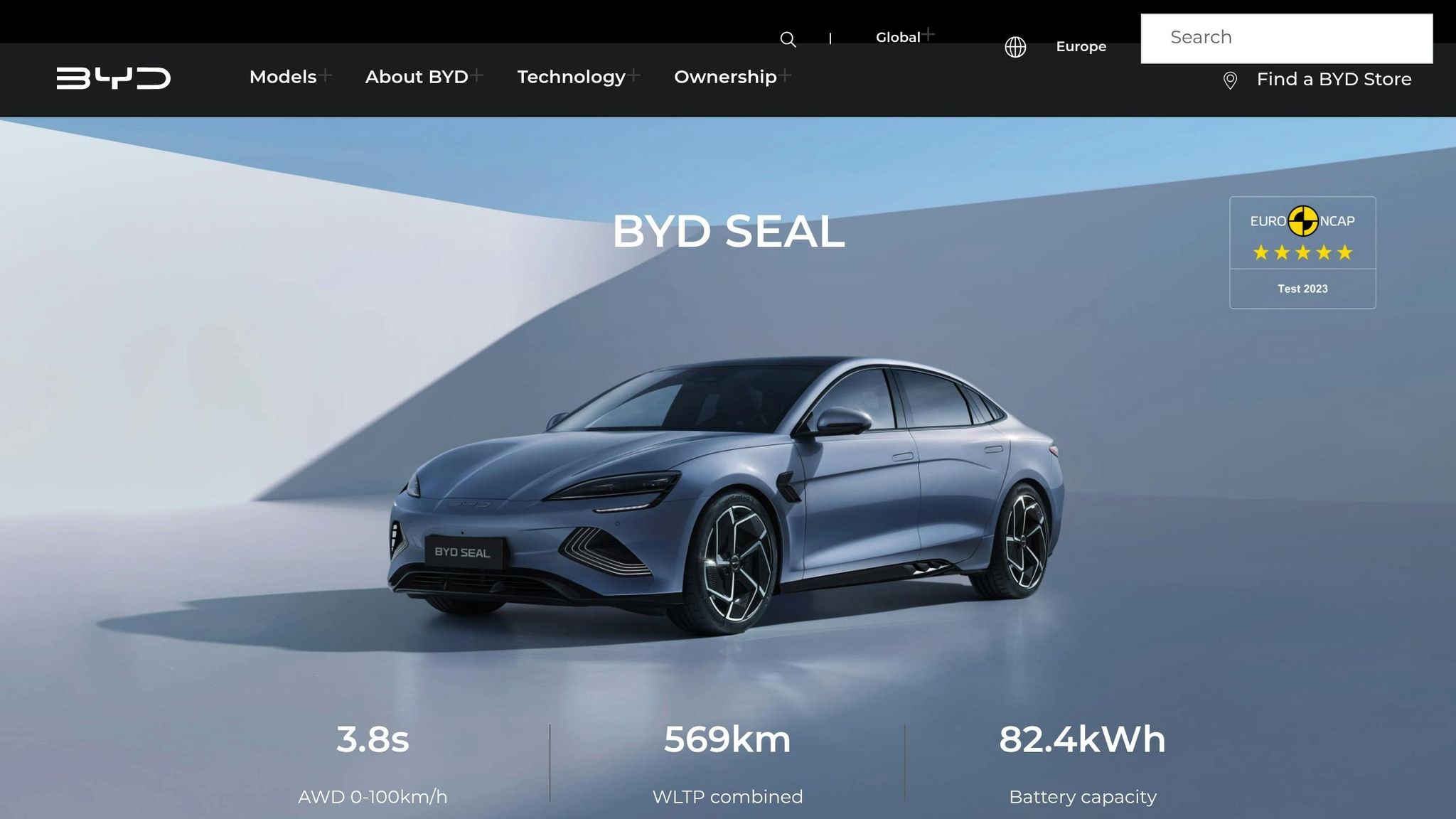
The BYD Seal brings a touch of sophistication to Namibia’s EV market. This premium electric sedan stands out with its modern design and advanced features, catering to drivers who want a balance of performance and efficiency. With its spacious interior and eco-friendly benefits, the BYD Seal is a strong contender for those seeking a refined electric driving experience.
Other Available EV Models
Namibia’s EV selection doesn’t stop there. Here are some additional models currently available:
- Hyundai Kona Electric SE: Priced at $32,875 with a range of 200 miles.
- Hyundai Ioniq 6 SE RWD: Offers an impressive 342-mile range for $42,700.
- Tesla Model 3 Long Range RWD: Starts at $42,490 with a 363-mile range.
- Tesla Model Y Long Range RWD: Priced at $44,990 and delivers a 337-mile range.
- Volkswagen ID.4: Comes in two variants – Standard at $39,735 with a 206-mile range, and Pro at $44,875 offering a 291-mile range.
These models highlight the growing variety of electric cars available, catering to different budgets and driving needs. Next, we’ll explore detailed pricing trends for both new and used EVs in Namibia.
Electric Car Prices in Namibia
After exploring the available EV models, it’s equally important to understand their pricing. Knowing the costs of electric vehicles (EVs) in Namibia can help you make an informed decision. Prices can differ significantly depending on whether you’re buying a new or used car.
Let’s take a closer look at how these price points compare.
New vs. Used Electric Car Prices
In Namibia, there’s a noticeable gap between the prices of new and used electric vehicles. For those stepping into the EV market for the first time, used models often provide a more budget-friendly option. They offer a chance to experience EV ownership without the higher upfront costs.
On the other hand, new electric cars come with perks like full warranties and cutting-edge technology. However, these advantages are reflected in their higher price tags. Don’t forget to factor in additional expenses, such as import costs (shipping, customs duties) and local registration fees, which can substantially impact the final price. These are essential considerations when planning your budget.
Financing and Payment Options
Namibian banks are now offering loans specifically designed for EV buyers. These financing options can vary in terms of loan duration, required down payments, and monthly installments, all of which depend on the car’s price, the loan term, and the interest rate.
In addition to bank loans, some dealerships provide in-house financing, which may offer more flexible down payment terms. Lease-to-own programs are also gaining traction, allowing buyers to gradually own the vehicle through manageable monthly payments. For those who prefer to pay upfront, cash purchases often come with room for price negotiations and eliminate financing fees entirely.
Whether you opt for a bank loan, dealership financing, or a cash purchase, it’s crucial to review all terms and fees carefully. This ensures you’re making a sound investment in your EV journey.
sbb-itb-99e19e3
What EV Owners Need to Know in Namibia
Owning an electric vehicle (EV) in Namibia comes with unique considerations compared to traditional cars. Understanding these factors can help you make the most of your EV experience while avoiding potential roadblocks.
Charging Stations in Namibia
Namibia’s EV charging infrastructure is still in its early stages, creating both opportunities and challenges for drivers. For now, most EV owners rely on home charging, either through standard household outlets or dedicated chargers. This setup works well for overnight charging, especially for daily commutes.
Public charging stations are slowly becoming available in larger cities like Windhoek and Swakopmund. These are typically found in shopping centers, hotels, and business hubs. However, the limited number of public stations makes home charging a necessity for most EV users.
"While Namibia’s commitment to sustainable energy and potential government incentives could boost EV adoption, the lack of charging stations is a significant obstacle." – Simonis Storm Economist Almandro Jansen
For long trips, planning ahead is crucial. Research charging points along your route and adjust your travel plans to ensure you don’t run out of power. Beyond charging logistics, EVs also offer a range of cost-saving benefits that make them an attractive option.
Money-Saving Benefits of Electric Cars
One of the biggest perks of owning an EV in Namibia is the long-term financial savings, thanks to lower maintenance costs. EVs require 31–50% less maintenance annually compared to gas-powered cars, with per-mile repair costs about 40% lower. This is largely due to their simpler design and fewer moving parts.
Additionally, with fuel prices steadily climbing in Namibia, charging an EV is generally much cheaper per kilometer than filling up a gas tank. Over a vehicle’s lifetime, maintenance costs for EVs average around $4,600, compared to $9,200 for gas-powered vehicles.
Government policies are also expected to play a role in shaping the EV market. According to Simonis Storm Economist Almandro Jansen, vehicle taxation and potential incentives for EVs could significantly influence Namibia’s automotive landscape. However, the specifics of these policies are still being developed.
Where to Buy Electric Cars in Namibia
Purchasing an electric vehicle (EV) in Namibia involves exploring both online platforms and local dealerships, each offering unique benefits to suit different preferences and needs.
Online Platforms and Local Dealers
Online platforms have gained traction in Namibia for EV purchases, thanks to their convenience and broader selection. A standout option is EV24.africa, which provides a variety of new and used electric vehicles from leading brands, with delivery services available across Africa.
Another platform, Autocraft Japan, features models like the Nissan Leaf 2025 for export, with prices starting at approximately $14,850 FOB.
For those who prefer a more hands-on approach, local dealerships are an excellent choice. In Windhoek, Electric Vehicles Namibia cc specializes in second-hand Nissan Leafs, with prices typically ranging from N$210,000 to N$270,000 (about $11,000–$14,000 USD). These dealerships cater to the specific needs of Namibian drivers, offering practical EV options designed for both urban and regional use.
Here’s a quick comparison of these purchasing options:
| Purchase Option | Key Advantages | Price Range | Best For |
|---|---|---|---|
| Online Platforms | Wide selection, delivery services, financing options | $11,000–$41,000+ | Buyers seeking variety and convenience |
| Local Dealers | Test drives, in-person support, immediate availability | N$210,000–N$270,000 | Buyers preferring hands-on experience |
Why Choose EV24.africa
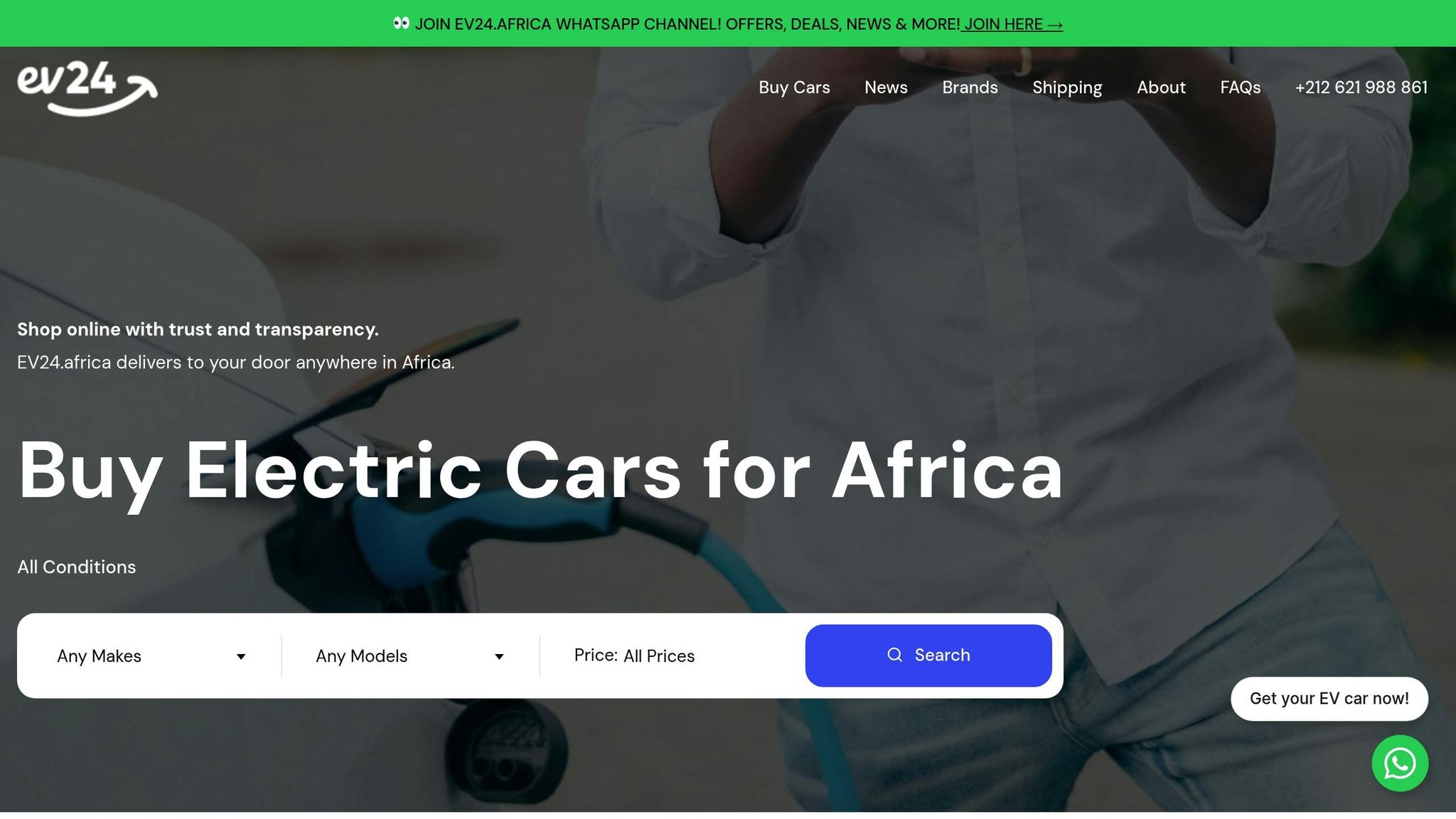
EV24.africa stands out for its transparent pricing, diverse vehicle inventory, and comprehensive services, including financing, customs clearance, and registration. The platform ensures there are no hidden fees by providing clear, upfront quotes.
"At EV24.africa, we simplify the process of importing and buying electric vehicles in Africa. Our expertise ensures a seamless, transparent, and stress-free experience, so you can focus on driving the future of mobility."
Recent listings on EV24.africa include the DONGFENG eπ 008 EV, priced at $28,700 USD. With flexible financing options, the platform helps make the transition to electric mobility more accessible, offering vehicles priced from around $15,000 to over $40,000.
By offering these services, EV24.africa plays a key role in supporting Namibia’s shift towards electric transportation.
Delivery Services
EV24.africa also ensures a smooth delivery process, providing door-to-door delivery across Africa. This includes handling customs clearance and local registration, so your vehicle is ready to drive upon arrival.
"Shop online with trust and transparency. EV24.africa delivers to your door anywhere in Africa."
Buyers can choose between RoRo (Roll-on/Roll-off) or container shipping, with options for port-to-port or door-to-door service. The delivery process includes assistance with all necessary documentation, such as proof of identity, proof of residence, and import paperwork. EV24.africa ensures compliance with Namibian regulations, making the entire process as seamless as possible.
Conclusion
Main Points
This guide has explored the pricing trends, model options, and ownership benefits of Namibia’s growing electric vehicle (EV) market. By 2025, electric mobility in Namibia offers affordability and variety for a range of budgets. Whether you’re looking at entry-level models starting at $5,880 or premium options like the BYD ATTO 3 priced at $47,500, there’s something for everyone.
For urban commuters, the Nissan Leaf delivers a practical 68-mile range. On the other hand, the BYD Shark 6 plug-in hybrid bakkie is tailored for Namibian drivers who need a vehicle that can handle both city streets and rural terrains. Used EVs provide an even more budget-friendly option, with second-hand Nissan Leafs priced between N$210,000 and N$270,000 (approximately $11,000–$14,000 USD).
Beyond affordability, EVs bring lower fuel costs, reduced maintenance expenses, and the convenience of an expanding charging network – all of which make electric vehicles an appealing choice for cost-conscious buyers.
Start Your EV Search on EV24.africa
EV24.africa is revolutionizing EV access in Namibia, offering Africa’s first dedicated online marketplace for electric vehicles. With delivery services spanning all 54 African countries, the platform ensures a smooth and hassle-free experience.
"At EV24.africa, we simplify the process of importing and buying electric vehicles in Africa. Our expertise ensures a seamless, transparent, and stress-free experience, so you can focus on driving the future of mobility." – EV24.africa
From customs clearance to local registration and door-to-door delivery, EV24.africa takes care of the logistics, making it easier than ever to embrace electric mobility. With transparent pricing, flexible financing options, and a wide inventory featuring top brands like Tesla, BYD, Volkswagen, and Mercedes-Benz, the platform connects buyers to the perfect EV for their lifestyle and budget.
Affordable models like the DONGFENG NanoBox, priced at $8,300, are just a click away. For those seeking premium options, EV24.africa has you covered too. Plus, their expert team provides personalized support throughout the purchase process, including assistance via WhatsApp.
FAQs
What is driving the growth of electric vehicles in Namibia by 2025?
The rise of electric vehicles (EVs) in Namibia by 2025 is being fueled by a few important developments. One standout factor is the creation of a regulatory framework for EV charging infrastructure. This effort is set to make charging stations more accessible and user-friendly, paving the way for a smoother shift to cleaner transportation options.
On top of that, EVs are gaining traction in urban logistics and ride-hailing services. These sectors are helping to make electric mobility a more practical and attractive option, not just for businesses but also for everyday drivers across Namibia.
How does owning an electric car in Namibia save money compared to a gas-powered car?
Electric vehicles (EVs) can save drivers in Namibia a lot of money compared to traditional gas-powered cars. One big reason? EVs have fewer moving parts, which means less wear and tear. Say goodbye to oil changes, transmission repairs, or dealing with exhaust system issues – those common maintenance headaches aren’t part of the EV experience.
On top of that, charging an EV is usually cheaper than filling up a gas tank. As Namibia continues to grow its network of charging stations, this cost advantage becomes even more noticeable. Over time, these factors make owning an EV a more budget-friendly option for many drivers.
What financing options are available for buying an electric car in Namibia, and how do they compare to traditional car loans?
Financing an electric car in Namibia generally comes down to two main options: installment sales or leasing.
With an installment sale, you make equal monthly payments over a set period, which includes VAT. Once you’ve made the final payment, the car becomes yours. It’s a straightforward path to ownership, making it a popular choice for individuals.
Leasing, on the other hand, is often a better fit for businesses. Your lease payments might cover operating costs and could potentially offer tax advantages, depending on your situation. However, unlike installment sales, leasing typically doesn’t lead to ownership when the term ends, offering flexibility but without the long-term asset.


